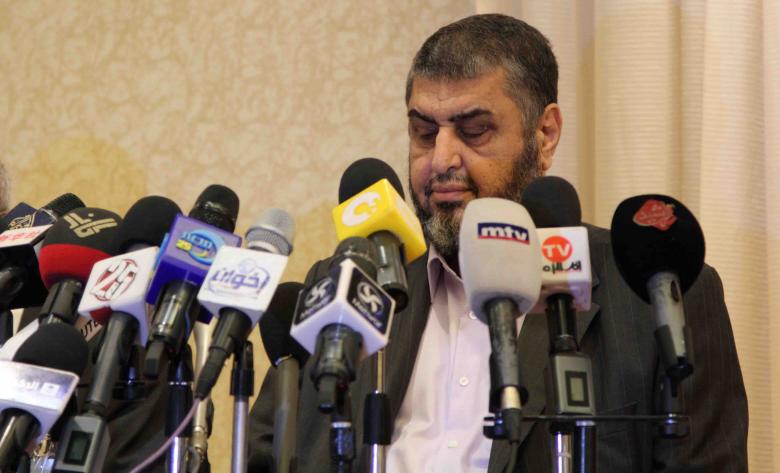 Muslim Brotherhood leader Khairat al-Shater shrugged off his disqualification from the presidential race as “a crime,” accusing the ruling military junta of interfering with the presidential election process and stalling “a genuine” handover of power to civilians.
Muslim Brotherhood leader Khairat al-Shater shrugged off his disqualification from the presidential race as “a crime,” accusing the ruling military junta of interfering with the presidential election process and stalling “a genuine” handover of power to civilians.
Shater warns of extended military rule and worsening economy
By-Almasry Alyoum
Copts and Poliltical Islam
00:04
Friday ,20 April 2012

On Tuesday, the Presidential Elections Commission handed down its final verdict on Shater’s candidacy by upholding an earlier decision to exclude him from the race on grounds that he is an ex-convict.
“It is both funny and sad that I get excluded from the elections due to verdicts made by an exceptional military court that [Hosni] Mubarak referred me to,” Shater told reporters in a news conference.
In 2006, Shater was arrested among tens of Muslim Brotherhood leaders and sent to a military tribunal in a massive raid on the group that followed their 2005 electoral victory.
In 2007, Shater, the group’s strongman, was sentenced to seven years in prison for money laundering and belonging to an illegal organization. As soon as Mubarak stepped down, Shater was released in March 2011 by Egypt’s new military rulers for medical reasons.
His release was seen as part of a larger understanding, and allegedly a prelude to a power-sharing deal between the nation’s largest political organization and the military junta.
Yet, his exclusion from the race was enough to prompt Shater to accuse the generals openly and unequivocally of being no different from Mubarak.
“It is not about Khairat al-Shater. It is clear that there are specific attempts with clear evidence to manipulate the transition to democracy and to bar the people from choosing their president and government in a genuine and democratic way,” he said.
“Perhaps the Supreme Council of the Armed Forces wants a president who is loyal to it, and then this president can bring a cabinet that is subordinate to it. Hence, we are not seeing a true change that the revolution wants and the people want, but we are seeing a clear attempt to reproduce the former despotic regime with few amendments,” added Shater, who resigned last month from his position as deputy supreme guide of the Muslim Brotherhood to compete in the presidential race set for 23 and 24 May.
Shater’s vocal criticism of the generals marks a new phase in recent Islamist-military tension over the distribution of power in the new order.
Since his release, Shater has been marketed as the architect of the group’s renaissance project that draws on development success stories of several countries, including Turkey and Indonesia. Upon Shater’s disqualification, the Muslim Brotherhood had announced that it would compete for the presidency with Mohamed Morsy, president of the group’s Freedom and Justice Party. Morsy is expected to inherit Shater’s campaign and platform.
Shater was one of ten presidential hopefuls that the commission disqualified, which included Mubarak’s Vice President Omar Suleiman, Salafi lawyer-turned-preacher Hazem Salah Abu Ismail and liberal politician Ayman Nour.
Nour and Shater were excluded for similar reasons. However, Abu Ismail was disqualified because his mother held US citizenship while Suleiman failed to submit the minimum number of signatures required from the Upper Egyptian governorate of Assiut.
In Wednesday’s news conference, Shater questioned the impartiality of the judicial body in charge of conducting and monitoring the poll, accusing its president, Farouk Sultan, of belonging to the old regime.
The engineer by training held his exclusion from the poll as evidence that Sultan “is still loyal to Mubarak.”
Shater went on to note that his group will exert pressure on power holders to modify the makeup of the presidential elections to ensure the integrity of the poll.
The Muslim Brotherhood is expected to participate in Friday protests called for by revolutionary youth-led groups to protest a provision in the interim constitution that bars any appeal of the election commission’s decisions and looming attempts to extend the transitional period.
Earlier this week, Field Marshall Hussein Tantawi told leaders of political parties that the generals would not hand over power to an elected president before a permanent constitution is drafted.
Given the current stalemate over the makeup of the Constituent Assembly tasked with writing Egypt’s post-Mubarak constitution, the statement was seen as a hint that the generals are contemplating postponing the power handover to beyond the 30 June target. However, Major General Mamdouh Shahin, a SCAF member, denied such speculation, insisting that the generals were committed to hold the presidential poll on time.
Shater warned against such a possibility, arguing that it might contribute to further deteriorating the economic situation.
“Any extension of the transitional period is a crime against Egypt,” he said, holding that it would lead to further exhaustion of foreign reserves, discouragement of foreign local investment and more job losses.


